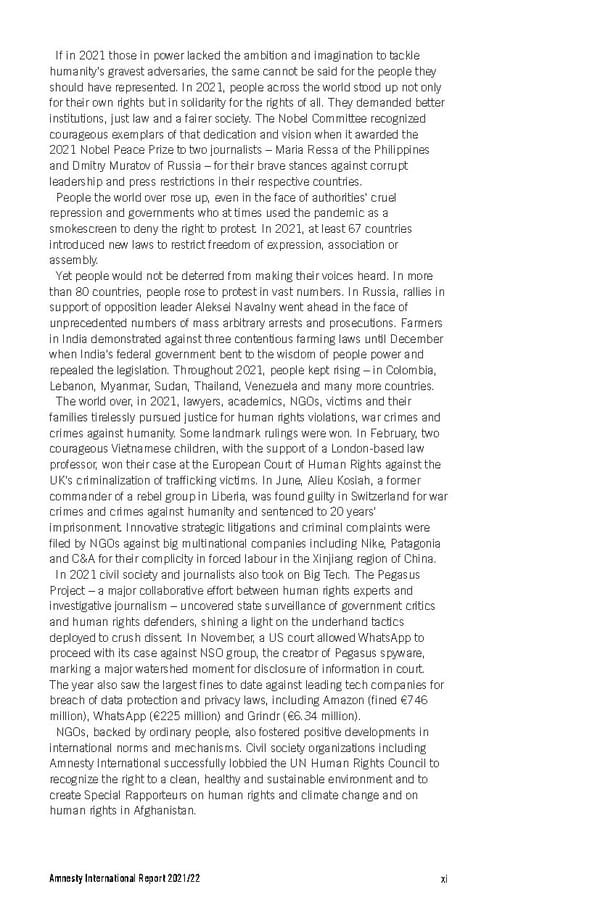If in 2021 those in power lacked the ambition and imagination to tackle humanity’s gravest adversaries, the same cannot be said for the people they should have represented. In 2021, people across the world stood up not only for their own rights but in solidarity for the rights of all. They demanded better institutions, just law and a fairer society. The Nobel Committee recognized courageous exemplars of that dedication and vision when it awarded the 2021 Nobel Peace Prize to two journalists – Maria Ressa of the Philippines and Dmitry Muratov of Russia – for their brave stances against corrupt leadership and press restrictions in their respective countries. People the world over rose up, even in the face of authorities’ cruel repression and governments who at times used the pandemic as a smokescreen to deny the right to protest. In 2021, at least 67 countries introduced new laws to restrict freedom of expression, association or assembly. Yet people would not be deterred from making their voices heard. In more than 80 countries, people rose to protest in vast numbers. In Russia, rallies in support of opposition leader Aleksei Navalny went ahead in the face of unprecedented numbers of mass arbitrary arrests and prosecutions. Farmers in India demonstrated against three contentious farming laws until December when India’s federal government bent to the wisdom of people power and repealed the legislation. Throughout 2021, people kept rising – in Colombia, Lebanon, Myanmar, Sudan, Thailand, Venezuela and many more countries. The world over, in 2021, lawyers, academics, NGOs, victims and their families tirelessly pursued justice for human rights violations, war crimes and crimes against humanity. Some landmark rulings were won. In February, two courageous Vietnamese children, with the support of a London-based law professor, won their case at the European Court of Human Rights against the UK’s criminalization of trafficking victims. In June, Alieu Kosiah, a former commander of a rebel group in Liberia, was found guilty in Switzerland for war crimes and crimes against humanity and sentenced to 20 years’ imprisonment. Innovative strategic litigations and criminal complaints were filed by NGOs against big multinational companies including Nike, Patagonia and C&A for their complicity in forced labour in the Xinjiang region of China. In 2021 civil society and journalists also took on Big Tech. The Pegasus Project – a major collaborative effort between human rights experts and investigative journalism – uncovered state surveillance of government critics and human rights defenders, shining a light on the underhand tactics deployed to crush dissent. In November, a US court allowed WhatsApp to proceed with its case against NSO group, the creator of Pegasus spyware, marking a major watershed moment for disclosure of information in court. The year also saw the largest fines to date against leading tech companies for breach of data protection and privacy laws, including Amazon (fined €746 million), WhatsApp (€225 million) and Grindr (€6.34 million). NGOs, backed by ordinary people, also fostered positive developments in international norms and mechanisms. Civil society organizations including Amnesty International successfully lobbied the UN Human Rights Council to recognize the right to a clean, healthy and sustainable environment and to create Special Rapporteurs on human rights and climate change and on human rights in Afghanistan. Amnesty International Report 2021/22 xi
 Amnesty International Report 2021/22 Page 10 Page 12
Amnesty International Report 2021/22 Page 10 Page 12